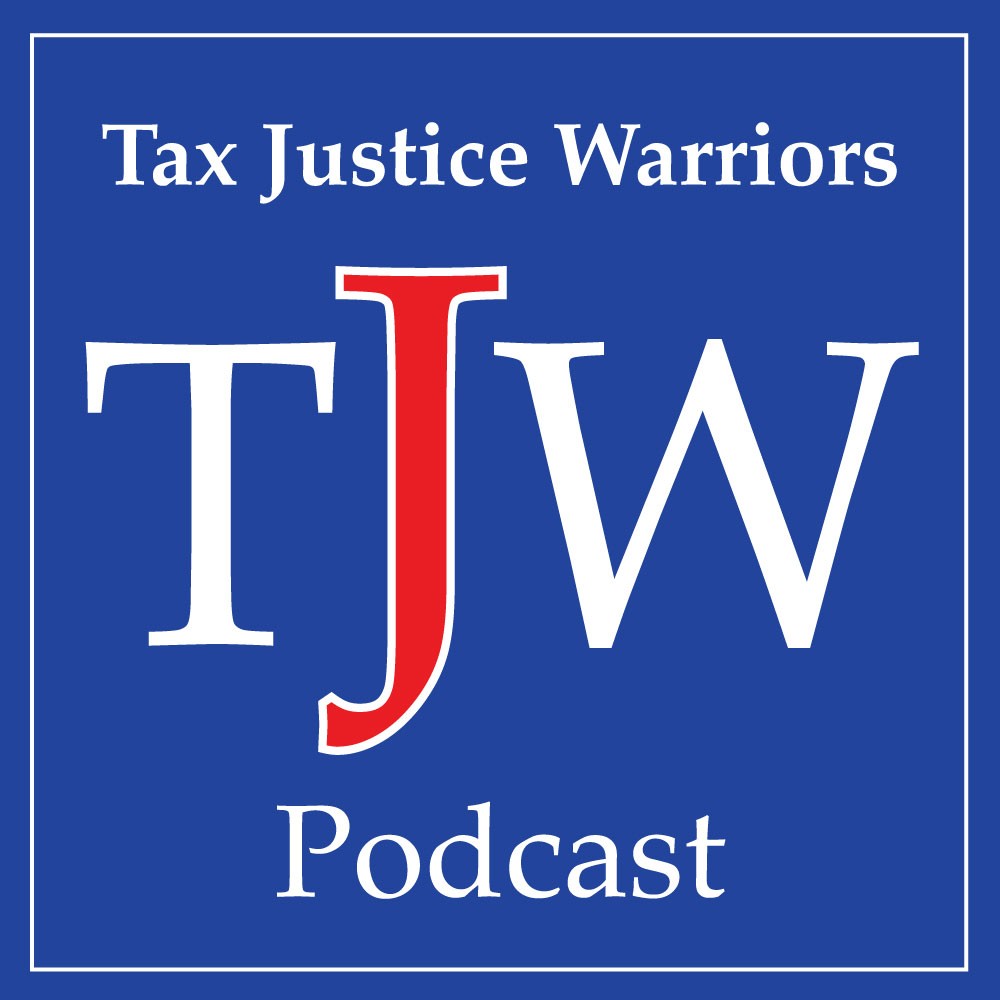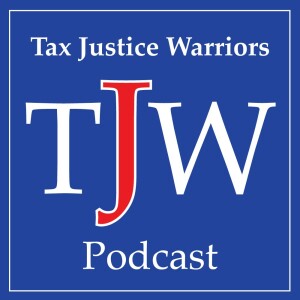
17.6K
Downloads
212
Episodes
Tax Justice Warriors is a podcast that focuses on tax controversy, Low Income Taxpayer Clincs (LITCs), educating the public, news, and interviews about taxes. The host is Omeed Firouzi, a practice professor and director of the low income taxpayer clinic at Temple University Beasley School of Law. The producer is Zac Harvey.
Tax Justice Warriors is a podcast that focuses on tax controversy, Low Income Taxpayer Clincs (LITCs), educating the public, news, and interviews about taxes. The host is Omeed Firouzi, a practice professor and director of the low income taxpayer clinic at Temple University Beasley School of Law. The producer is Zac Harvey.
Episodes

Friday May 08, 2020
Episode 97: Interview With Andrew Belter
Friday May 08, 2020
Friday May 08, 2020
A return appearance for a discussion with Andrew Belter, Clinic Director and Qualified Tax Expert of the Low Income Taxpayer Clinic at the Legal Aid Society of Milwaukee. We discuss tax cases and working with the IRS during times of COVID-19. Again, my apologies for any audio issues in the recording.

Friday May 01, 2020
Episode 96: Interview With Andrew Aleman
Friday May 01, 2020
Friday May 01, 2020
I interviewed Andrew Aleman, an attorney with the Law Offices of Nick Nemeth, PLLC in Dallas, Texas. Andrew has his LL.M. in tax, volunteered for Rhode Island Legal Services, and has been a site coordinator for the VITA program. He gives his thoughts on working remotely and adapting to technology in our current work situation. Note: I apologize for the audio issues as Andrew is tough to hear.

Friday Apr 24, 2020
Episode 95: Interview With Shanthy Bala
Friday Apr 24, 2020
Friday Apr 24, 2020
An interview with Shanthy Bala of Florida Rural Legal Services. She will share experiences of recently joining the Low Income Taxpayer Clinic program, benefits of going to American Bar Association meetings, and the transition to working remotely during recent changes due to the coronavirus.
https://www.frls.org/services/tax-assistance/

Friday Apr 17, 2020
Episode 94: Further Coronavirus Tax News
Friday Apr 17, 2020
Friday Apr 17, 2020
Two main items to report on:
First, while the IRS extended individual income tax filing to July 15, 2020, there were other tax deadlines that needed to be extended. What about the deadline for 2016 tax refunds? The IRS issued a notice that addressed these issues and gave an extension for Tax Court deadline filing.
Second, a big item of news is the economic impact payments. What are amounts people will receive? Who will qualify? How should people sign up with the IRS? What information is needed when signing up?
Find out these and further details.
Stay safe out there!

Friday Apr 10, 2020
Episode 93: Liens, Levies & Collection Due Process
Friday Apr 10, 2020
Friday Apr 10, 2020
This is a bit of a survey regarding liens and levies, then turning to collection due process. This starts to inform you regarding what happens when a taxpayer receives a notice from the IRS regarding a lien or levy (what is the difference?). From there, the taxpayer might qualify for Collection Due Process. Collection Due Process has areas based on notices, Appeals, and Tax Court. I am part of the Collection Due Process Summit Initiative and there is quite a bit of information that could be covered on those topics so I am listing past episodes on those topics. Episodes 43 and 44 were on liens and levies. Episodes 39, 50, 70, 77 and 80 were on collection due process.

Friday Apr 03, 2020
Episode 92: Familes First Coronavirus Response Act
Friday Apr 03, 2020
Friday Apr 03, 2020
As part of recent legislation related to the coronavirus, the Families First Coronavirus Response Act was signed into law on March 18, 2020. This law temporarily expands the Family and Medical Leave Act of 1993 (FMLA) to allow American businesses with fewer than 500 employees to provide employees with paid leave, either for the employee's own health needs or to care for family members. Tune in to find out more.

Wednesday Apr 01, 2020
Episode 91.5: Further Coronavirus Tax Updates
Wednesday Apr 01, 2020
Wednesday Apr 01, 2020
Boy, the coronavirus news just keeps coming, doesn't it? To begin with, there is the IRS People First Initiative that announces ways the IRS is delaying various collection activities. But do you know about some closures and social distancing situations that are also going on at the IRS? Tune in to learn more.

Friday Mar 27, 2020
Episode 91: Coronavirus Tax Updates
Friday Mar 27, 2020
Friday Mar 27, 2020
There have been several updates in the tax world in reaction to the coronavirus. The big change is the delay for the filing season to July 15, 2020. However, there are several updates at the federal and state level, plus I give some Kansas City updates. Tune in to hear about the updates, but there will be another episode as the changes keep coming!

Friday Mar 20, 2020
Episode 90: Family-Related Tax Issues (2 of 2)
Friday Mar 20, 2020
Friday Mar 20, 2020
After a brief update on coronavirus effects on the tax world, this episode brings a discussion of family-related tax issues. To start, the filing status chosen has different effects on the tax return. Specifically, when a married couple files a joint tax return, there could be further issues. That leads to the difference between injured spouse relief and innocent spouse relief.
Injured spouse relief applies when one spouse’s refund will be applied to the other spouse’s government debt.
Innocent spouse relief applies to married couples with tax debt when one spouse dies, there is a legal separation/divorce, or the spouses have been separated for 12 months. The requesting spouse cannot amend a joint tax return so must file for innocent spouse relief to get the debt divided or if the debt is all connected to the other spouse’s income. The form requires details about the marriage including education levels, involvement with filing the taxes, and whether there was domestic violence. Since there is so much to innocent spouse relief, I will be doing a follow-up episode.

Friday Mar 13, 2020
Episode 89: Midterms and Coronavirus Tax News
Friday Mar 13, 2020
Friday Mar 13, 2020
This episode will be a mixture of tax topics. What is in this tax gumbo, you ask? First, we start with student reflection papers to tax procedure. Hear about their reactions to this kind of work and how it may affect them. Following that, there is tax news such as the new National Taxpayer Advocate, Erin M. Collins. Finally, there are coronavirus shutdowns that affect the tax world. I hope this is a tasty mix of tax sustenance to get you through this current situation.
